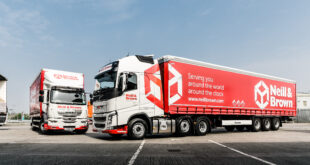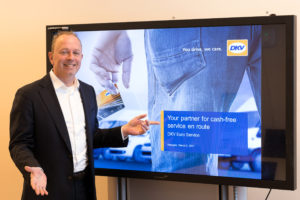Blog series on the transport industry by 2030 by Gertjan Breij, Managing Director DKV Euro Service Benelux
Right now we find ourselves in the era of the 4th industrial revolution; an epoch of digital transformation making itself felt already now. Developments like digital warehousing, the Internet of Things, cyber physical production systems and production environments largely composed of robots and artificial intelligence cause rapid changes in the world of transport and logistics. The future is already taking shape today. Parties that do not move along, that fail to transform digitally may no longer be in existence in ten years’ time, having been supplanted by new, innovative counterparts. What does all this mean for you?
Let us start by presenting you a brief sketch of the industrial revolutions we have known so far. The first industrial revolution is characterised by the invention of steam power and the introduction of postal services in communication. The second industrial revolution is marked out by the deployment of electricity and telephony. The third industrial revolution has brought automation and the internet. The current, fourth industrial revolution stands in the sign of digital transformation.
In this respect it is important for us to realise that the speed of change is picking up more and more. Whereas the first industrial revolution started in England around 1750 to last until 1860, the third industrial revolution did not take more than a few decades. Moore’s Law is still in operation; a fact confirmed by research carried out by Accenture[1] showing 86 per cent of respondents expecting the speed of technological change to pick up by hitherto unknown proportions in three years to come. In the world of transport and logistics it is no option to assume a position of wait-and-see. On the contrary, failing to move from A to B more than likely means petering out. Innovative newcomers will invade the industry, threatening the status quo by deploying new earning models. Consider for instance game changers like Uberrush and Instacart.
Now what does this imply for you in your capacity as a haulier? First and foremost it requires your company to continue to invest in automation of your current haulage organisation and in this new world to come. This involves automation in fields varying from optimal route planning to all actions regarding fleet management. DKV Euro Service contributes its support in its function as mobility partner, providing services like DKV eREPORTING, its highly versatile analysis tool for optimum control of all DKV transactions relating to your fleet. DKV’s digital fleet service provides you with all individual, fully updated fleet records at one touch of the button, 24 hours per day.
A second point for you to consider is the cost-reducing aspect. With the industry having been affected by huge cuts in the past years, will further cost reductions be anyhow possible, or would you instead be required to take a closer look at your product and service package in order to venture away from generalist to specialist for instance, thereby adding greater value to the supply chain for the benefit of your customers? How to deal with the assets that impact your budget? Can you imagine disruptive ways for performing non asset-based operations? And last not least: be aware that a change is also bound to impact your internal organisation.
The future is already taking shape here and now. Companies that are unaware of this, that embrace the status quo, are not likely to survive. This means that companies that operate in transport and logistics are now required to formulate an answer to the question of where they would prefer to stand in 15 years’ time. Although I find this an interesting state of affairs I must confess that developments are at the same time progressing at haunting speed. In one of my next blogs I will be entering somewhat more deeply into a few macro, meso and micro trends that find their immediate origin in today’s increasing digitalisation and the role of DKV Euro Service in this respect. At the same time I am pleased to invite you to join me in this continuing exchange of views.
[1] Source: https://executive-people.nl/545162/snelheid-van-technologische-verandering-gaat-tot-ongekende-proporties-toenemen.html
 DKV BeNeLux You drive, we care
DKV BeNeLux You drive, we care


